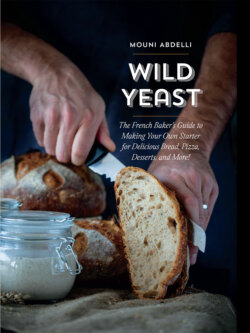Читать книгу Wild Yeast - Mouni Abdelli - Страница 11
На сайте Литреса книга снята с продажи.
SALT
ОглавлениеWhile we use salt every day to enhance the taste of what we cook, salt also plays an important role in breadmaking, not just for its ability to bring out flavor but also for its function in the breadmaking process. This is true at every stage of the process, including during the baking itself.
Beginning with the first phase of preparation, the salt comes into contact with the proteins in the flour. This interaction gives stability to the glutinous network, which will later allow for better retention of the fermentation gases, whose speed will be slowed down and regulated by the presence of salt.
In addition, salt has hygroscopic properties, which means that it retains water and humidity. (This is why you are advised never to let baker's yeast come into contact with salt, which would tend to dehydrate it.) But these properties also make the dough easier to work with and make it possible to slow down the drying out of the final product. They also guarantee a lovely, delicate, golden crust during baking.
There are various kinds of salt that are commercially available. I most often use untreated, un-refined sea salt in my bread recipes.
